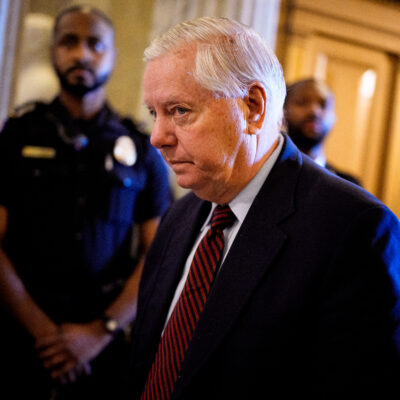
Dominic Gwinn/Middle East Images via AFP
Trump’s embattled Pentagon pick Colby holds close ties to Obama’s foreign policy advisors
Elbridge Colby worked at the Democrat-aligned WestExec consulting firm and the center-left Center for American Security think tank, where his views on Iran were ‘to the left of most Democrats’
In recent days, allies of Elbridge Colby, the Trump administration’s pick for a key Pentagon role, have vocally come to his defense as he continues to face skepticism from some top Senate Republicans over his accommodationist approach to a nuclear Iran and calls for a reduced U.S. military presence in the Middle East, among other sources of scrutiny.
Colby, now awaiting his first confirmation hearing before the Senate Armed Services Committee to be undersecretary of defense for policy, the No. 3 job in the Pentagon, has drawn enthusiastic endorsements from a range of leading MAGA stalwarts, including Donald Trump Jr., Charlie Kirk and Vice President J.D. Vance, each of whom went public last week in a team effort to bolster support for the embattled nominee.
But while Colby worked as a defense official during the first Trump administration and has since been particularly eager to demonstrate his commitment to President Donald Trump’s “America First” agenda, his newfound status as a MAGA favorite has come in spite of his deep professional ties to Democratic foreign policy circles — where his views, until not too long ago, found a more receptive home.
Though he has always identified as a conservative, Colby, 45, has over the past several years held top positions at an influential foreign policy think tank aligned with Democrats and worked for a consulting firm that operated as a staffing pipeline to the Biden administration. Previously, Colby was an advisor on nuclear disarmament for the Obama administration and an assistant to Sen. Elissa Slotkin (D-MI), who earlier served in the CIA and Defense Department.
In addition to Republicans, Colby has credited top Democratic national security officials from both the Obama and Biden administrations with shaping his positions — which have long provoked controversy among traditionally hawkish conservatives.
Colby’s supporters have for the most part ignored his past connections, portraying him as an America First purist whose early opposition to the Iraq War and frequent criticism of the GOP’s once-dominant hawkish wing have made him something of an intellectual progenitor of Trump’s foreign policy vision.
Yet his recent political evolution from a creature of the bipartisan Washington defense establishment to a MAGA convert suggests an ideological malleability typical of those seeking employment in the second Trump administration.
Meanwhile, as Colby’s New Right supporters herald him as a crucial pick to help guide Trump’s policies on the global stage, his critics argue that the nominee is not aligned with the administration on key issues — most notably confronting Iran and engaging in the broader Middle East, a region he has dismissed as “relatively unimportant” as a geopolitical concern for the United States.
The ongoing tensions underscore how Colby — in partnership with a like-minded younger generation of neo-isolationist defense experts now populating the middle rungs of the Pentagon — is expected to achieve a degree of influence that could significantly reshape American foreign policy decisions, raising alarms among mainstream conservatives who are fearful the Defense Department may be less instinctively supportive of Israel and its long-standing alliance with the U.S.
Even among Democrats who intersected with him amid negotiations over the Iran nuclear deal during the Obama years, which Trump withdrew the U.S. from in his first term, Colby’s approach to the Islamic Republic was viewed as relatively unorthodox, said a Democratic national security expert familiar with his record on Middle East policy.
Between 2014 and 2017, Colby was a senior fellow at the Center for a New American Security, a think tank founded by a group of national security experts with close ties to the Clinton administration. He left to join the Trump administration — where he served for just over a year as a deputy assistant secretary of defense — but returned in 2018 to direct the group’s defense program.
During his time at the organization, Colby was largely seen as a “reasonable” conservative foreign policy thinker whose oft-repeated warnings about preparing for a rising China above all other threats placed him in a firmly realist camp, according to the Democratic national security expert, who crossed paths with him in the final years of the Obama era.
But his views on deterring a nuclear Iran, which he has controversially deemed “an eminently plausible and practical objective,” were otherwise interpreted as unusually accommodationist and even “put him to the left of most Democrats,” the national security expert recalled, speaking on condition of anonymity to address a sensitive subject. “Frankly, I thought it was a worst-case scenario.”
In social media comments earlier this month, Vance defended Colby’s ties to CNAS, arguing that he had “built a relationship” with the think tank “when it was one of the few institutions that would even hire a foreign policy realist.” Vance, who has cited Colby as an influence of his, said the nominee “has consistently been correct about the big foreign policy debates of the last 20 years,” claiming his criticism of the Iraq War had “made him unemployable in the 2000s-era conservative movement.”
In a statement to Jewish Insider on Sunday night, Arthur Schwartz, a spokesperson for the Pentagon transition, said that Colby “enjoys the full support of the White House.”
“We expect that he’ll be reported out of committee in the coming weeks and that” Sen. Majority Leader John Thune (R-SD) “will bring his nomination before the full senate as soon as possible thereafter,” Schwartz added.
Previously, Colby’s views on Iran had stymied his effort to become a foreign policy director for Jeb Bush’s fledgling presidential campaign in 2015. Even as he had worked for Mitt Romney’s campaign just a few years earlier, Colby reportedly faced internal objections that his public writings on Iran could sow tension among hawkish Republicans backing the former Florida governor.
After serving in the Trump administration, Colby was enlisted as a senior advisor for WestExec Advisors, a consulting firm launched in 2017 by former Obama officials described as the Biden administration’s “Cabinet in waiting.” The firm, which has drawn scrutiny for not disclosing its clients, was co-founded by former Secretary of State Tony Blinken and Michèle Flournoy, a top defense policy official in the Obama administration who a decade earlier formed CNAS.
In the acknowledgements section of Colby’s 2021 book, The Strategy of Denial: American Defense in an Age of Great Power Conflict, he lists Flournoy as among the “many friends, mentors, colleagues and supporters” who helped to shape his ideas. He also cites Jon Finer, a principal deputy national security advisor in the Biden administration, as an influence among several people who read and commented on the manuscript.
A spokesperson for WestExec said that Flournoy was unavailable for an interview last week and did not respond to requests for comment. The firm also did not share details on Colby’s time there, which he has not publicly addressed. Finer did not respond to a request for comment.
As Colby has zigzagged between Republican and Democratic foreign policy circles during his career, critics and former colleagues say they noticed a shift leading up to the Jan. 6, 2021, attack on the Capitol, when he publicly backed Sen. Josh Hawley (R-MO) — whom he also lists as an influence in his book — in objecting to the certification of the presidential election.
In a stinging social media thread last year, James Acton, a co-director of the Nuclear Policy Program at the Carnegie Endowment for International Peace who has worked closely with Colby and once viewed him as a personal friend, said his “opinion of Colby changed around the 2020 presidential election.”
Acton, who did not respond to requests for comment, wrote that Colby’s behavior during the election deserves further scrutiny and “should be disqualifying from participation in the national security discourse.”
That sentiment was shared by several of Colby’s former Democratic colleagues who were “appalled” by his public statements raising doubts about the election and have since “walked away from him,” even as they had “seen him as someone they could work with and respect,” said the national security expert.
In a recent interview with JI, Robert O’Brien, a former Trump national security advisor, argued that Colby, who goes by Bridge, has “been mischaracterized” by his detractors. “I think Bridge’s concern is that the United States can only do so much,” he continued. “The idea is for our allies and our partners to carry more of the burden in other regions so that the U.S. can concentrate on China. I don’t disagree with that.”
But Colby’s efforts to ingratiate himself to the MAGA wing of the Republican Party may fit into a broader pattern, suggested one conservative foreign policy expert who has been critical of Colby’s views and spoke on condition of anonymity to avoid reprisals. The foreign policy expert interpreted Colby’s role at WestExec, for instance, as “proof” of what she called his “flexibility,” saying he “once wanted to abandon Ukraine to save Taiwan, and now doesn’t want to save Taiwan.”
As Colby favors U.S. pullback from Ukraine and Europe in addition to the Middle East, his views have also raised questions about whether he believes the U.S. should come to Taiwan’s defense, having recently argued that the island nation claimed by China is not “an existential interest” and “Americans could survive without it.”
Colby, a so-called defense prioritizer who calls for marshaling defense resources to prepare for what he has described as a “looming threat from China,” stayed at WestExec for over three years, according to his LinkedIn profile, departing in 2021 to join an advisory firm helmed by Robert O’Brien, a former Trump national security advisor. Colby has also led his own think tank, The Marathon Initiative, whose website says it is “focused on developing strategies to prepare the United States for an era of sustained great power competition.”
In a recent interview with JI, O’Brien argued that Colby, who goes by Bridge, has “been mischaracterized” by his detractors. “I think Bridge’s concern is that the United States can only do so much,” he continued. “The idea is for our allies and our partners to carry more of the burden in other regions so that the U.S. can concentrate on China. I don’t disagree with that.”
Still, Colby’s apparent waffling over Taiwan has otherwise stirred speculation over the direction he will take on other issues if he is nominated to serve in a senior role in the Pentagon. While he has voiced support for Israel, Colby has also recently called for a “reset” on the U.S.-Israel relationship to confront Beijing. Elsewhere, he has more broadly cast doubt on the importance of “alliance relationships,” saying that they are “more like deep business partnerships and if they stop making sense for one side you know you’re not going to continue with them.”
Colby’s allies insist he is aligned with the Trump administration on Israel and Iran, as the president seeks to expand the Abraham Accords and return to his maximum-pressure campaign targeting the Islamic Republic, among other moves. Last week, Trump’s national security advisor, Mike Waltz, said that Colby “has the president’s full support to be the undersecretary of policy,” which he described as a “critical” role for implementing the administration’s “America First policy.”
William Daroff, the CEO of the Conference of Presidents of Major American Jewish Organizations, also wrote a letter to the committee proposing a range of questions Colby should face in his first confirmation hearing, which has yet to be scheduled, “that reflect serious concerns raised by our member organizations.”
Waltz declined to confirm if he had been lobbying on Colby’s behalf, as the administration has faced scrutiny from Sen. Tom Cotton (R-AR) and other leading defense hawks over the nominee’s views on Iran. In recent days, four Republican senators have privately reached out to the White House to air their concerns, according to people with direct knowledge of the matter who spoke on condition of anonymity to address a sensitive situation.
The Jewish community has been divided on Colby, who served as a national security advisor to Florida Gov. Ron DeSantis’ presidential campaign before Trump won the nomination. The Republican Jewish Coalition is rallying behind Colby, urging his “swift nomination” in a recent letter to Sen. Roger Wicker (R-MS), the chairman of the Senate Armed Services Committee, despite differences on key issues.
William Daroff, the CEO of the Conference of Presidents of Major American Jewish Organizations, also wrote a letter to the committee proposing a range of questions Colby should face in his first confirmation hearing, which has yet to be scheduled, “that reflect serious concerns raised by our member organizations.” The letter raised further concerns about another defense appointee, Michael DiMino, now deputy assistant secretary of defense for the Middle East, whose views on Iran and Israel have likewise stoked anxiety among some pro-Israel activists.
One issue that other critics of Colby have proposed as a worthy line of inquiry focused on how he would approach a nearing deadline to renegotiate the current 10-year, $38 billion agreement between the U.S. and Israel, which provides $3.8 billion in military aid and missile-defense funding to Israel annually and is set to expire in 2028.
“Providing Israel with $40 billion over 10 years does not seem like a Bridge Colby policy,” a Democratic foreign policy advisor told JI.
“Senators should raise this at the Colby confirmation hearing and get his pledge that neither he nor DiMino will be trying to hold back or make trouble,” said one conservative foreign policy expert who is privately worried about Colby’s rise.
A Democratic foreign policy advisor also proposed asking about a commitment, speculating that Colby and DiMino could play key roles in the negotiations. “Providing Israel with $40 billion over 10 years does not seem like a Bridge Colby policy,” the Democrat told JI.
While some former colleagues have been surprised by Colby’s recent turn to the far right, others see a continuity. A former defense official in the Obama administration, who worked with Colby on nuclear disarmament talks more than a decade ago and has sporadically kept in touch with him since, said he does not “always agree with” the nominee’s policy prescriptions but views him as “a serious thinker.”
The former defense official, who asked to remain anonymous to avoid being quoted alongside critics of Colby, said that the nominee’s new position as an America First favorite is consistent with his foreign policy vision — though “not because he represents” the MAGA movement.
“I think MAGA has an unsophisticated take on geopolitics and U.S. foreign policy and they latch on to people who they think are aligned ideologically,” the former official told JI last week. “I don’t actually think they are aligned that much in this case.”
Additional reporting contributed by JI senior congressional correspondent Marc Rod and congressional correspondent Emily Jacobs.






